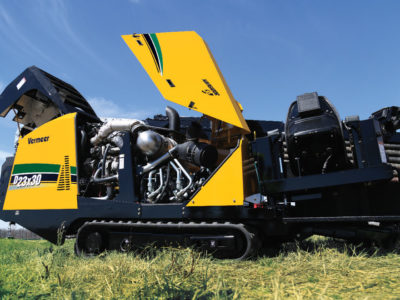We are people of routine. Every day, we perform the same tasks, in the same order, in the same way. Whether it’s getting ready in the morning, putting kids to bed at night or what you eat for lunch, these habits become part of who we are and how we operate. The same is true with your drilling equipment. Every time you drill, you have a certain order and method of operation you follow. You transport it, set it up, add your mix, turn the drill on and start drilling. You have a set way of drilling, even if it may change depending on the ground conditions and jobsite setup.
You should also have a set habit when it comes to daily inspections of your drill. Having a daily inspection routine can help keep a machine and a jobsite running efficiently. Below are the steps you should follow to daily inspect your Vermeer horizontal directional drill. Please refer to the operator’s and maintenance manual for your specific machine requirements.
Daily inspection process
Here’s the daily list of areas you should inspect and address on your Vermeer HDD.
First, make sure you inspect all shields and safety decals for any damage and replace as needed. Before starting the engine, check the engine oil and coolant, hydraulic oil and fuel levels. After you check those fluids, you should also check the air filter restriction indicator.
Next, inspect the machine for hydraulic leaks and the electrical harnesses for loose connections and fraying. Common areas to inspect may include the engine compartment, stakedowns, carriage and hose carrier.
After that, you should inspect the front and rear vises for wear and replace as needed. A best practice to help minimize excessive wear on the vises is to clean them thoroughly at the end of each day, making sure the vise teeth are free of grease and debris.
Lastly, it is important to have clean threads before using a thread gauge. Inspect the wear on the sub saver and replace if excessive wear is visible. Once you’ve examined that, open the grease bucket to check the level and replace if needed.
The best practice is to test the grease nozzle to make sure it sprays in the appropriate area and the adequate amount of grease comes out. You can test this by spraying grease on the sub saver threads.
Once you’ve done all of that, it is best practice to wash and grease the machine at the end of each day.
Performing a daily inspection can help keep your machine running efficiently. Make this a habit and a regular routine for your crew. This helps with overall machine efficiency, but it can also help identify any issues or problem areas before they become critical. If you have any questions, contact your local Vermeer dealer. Watch the video below to see how it’s done:
Vermeer Corporation reserves the right to make changes in engineering, design and specifications; add improvements; or discontinue manufacturing at any time without notice or obligation. Equipment shown is for illustrative purposes only and may display optional accessories or components specific to their global region. Please contact your local Vermeer dealer for more information on machine specifications.
Vermeer and the Vermeer logo are trademarks of Vermeer Manufacturing Company in the U.S. and/or other countries. © 2022 Vermeer Corporation. All Rights Reserved.
